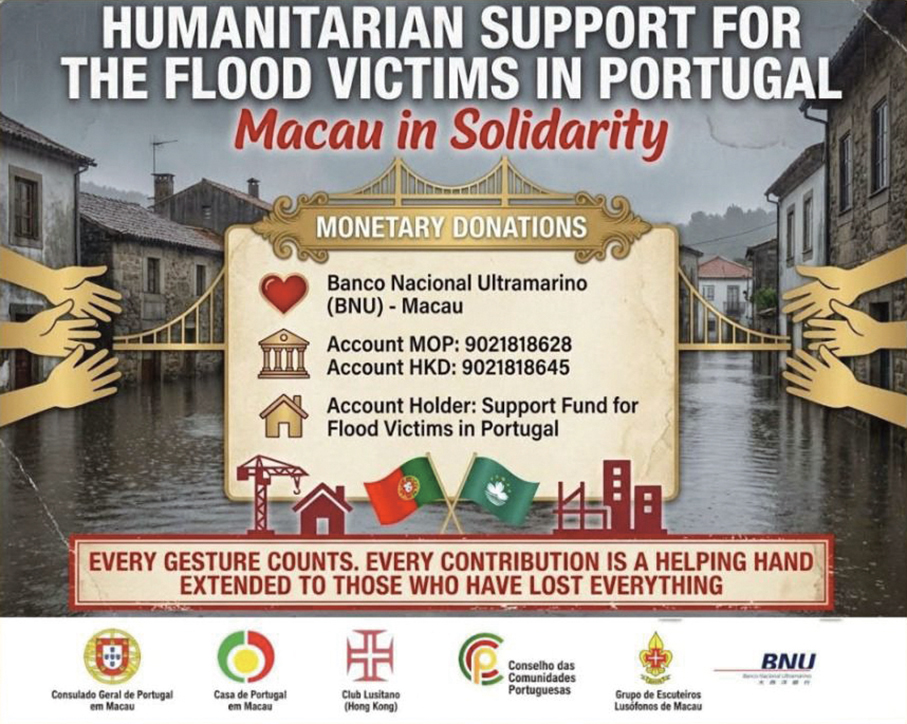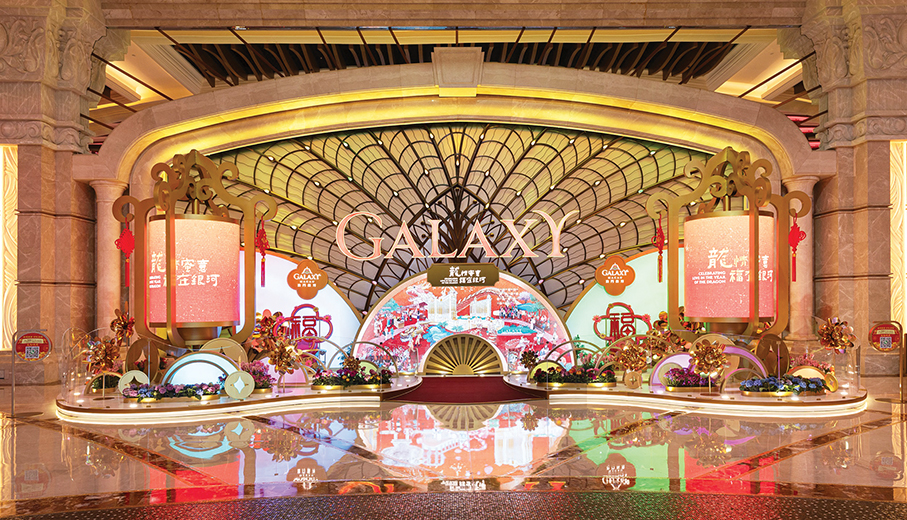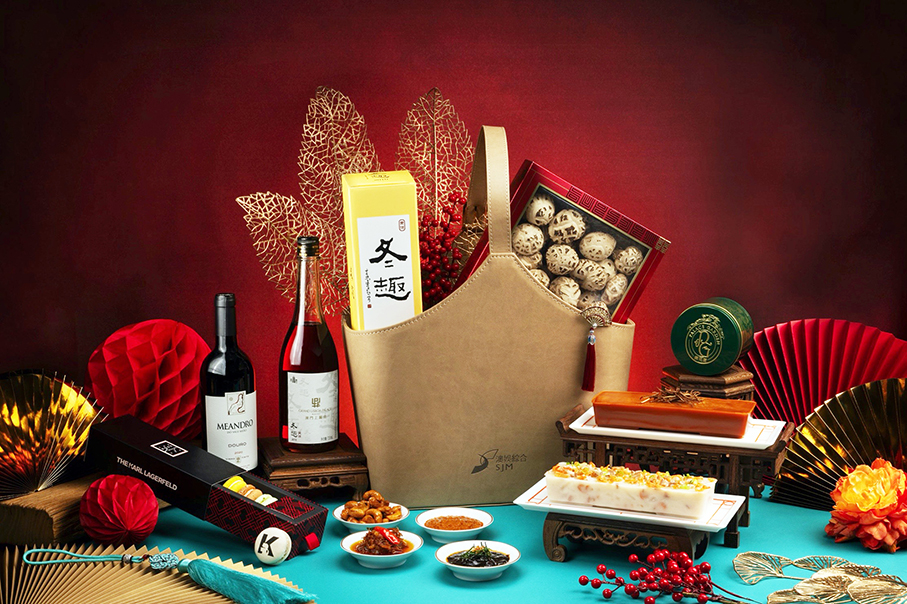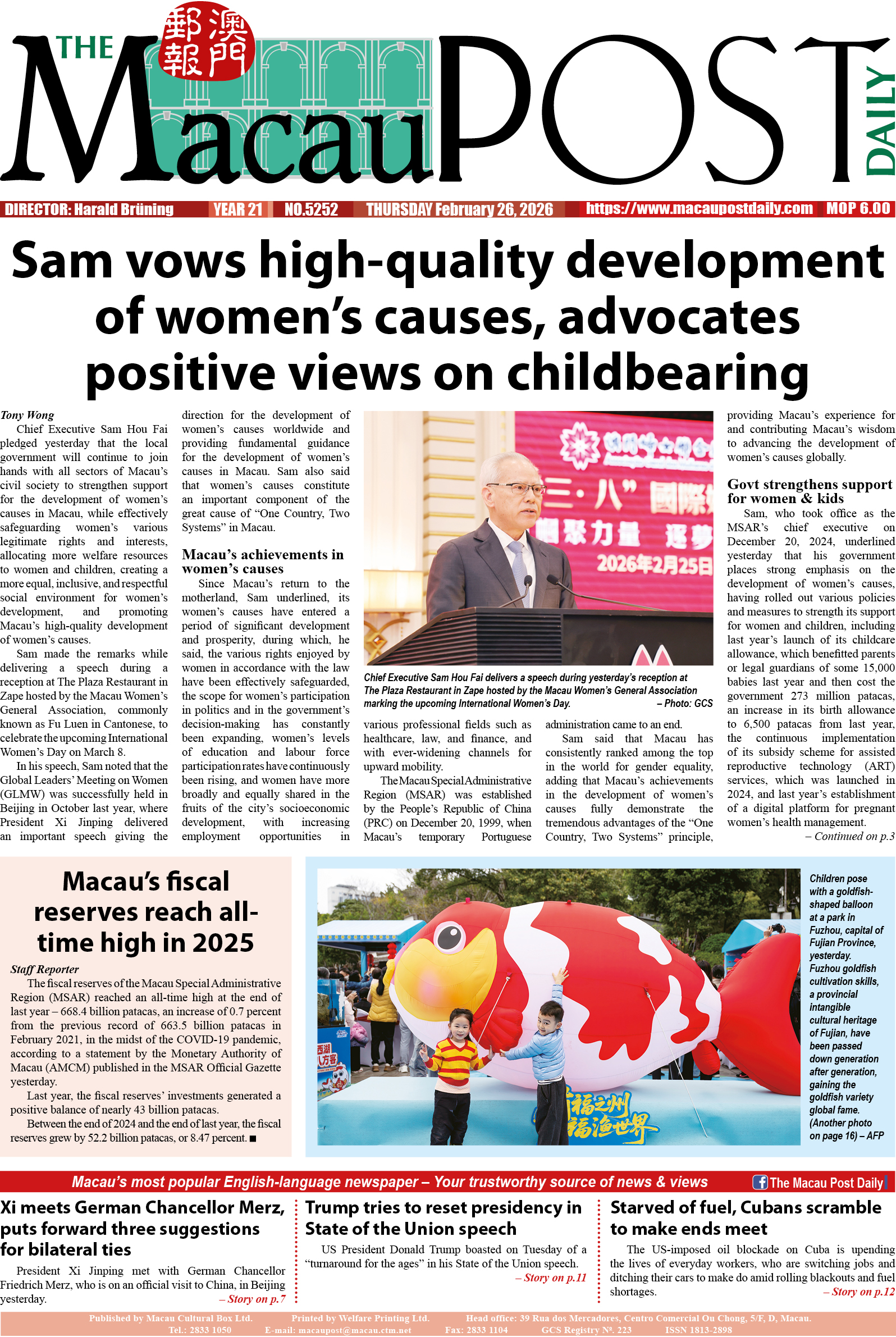Chief Executive Ho Iat Seng announced yesterday afternoon that the government has decided to cancel all its Chinese New Year (CNY) celebratory events with the aim of minimising the possibility of people becoming infected with the novel coronavirus, colloquially known as Wuhan virus, considering that Macau has already recorded two imported case and the virus is spreading on the mainland.
In a press conference at Government Headquarters, Ho urged residents not to go out if not necessary during the Chinese New Year (CNY) holiday and instead stay at home to relax and take a rest, so as to prevent being infected with the Wuhan virus.
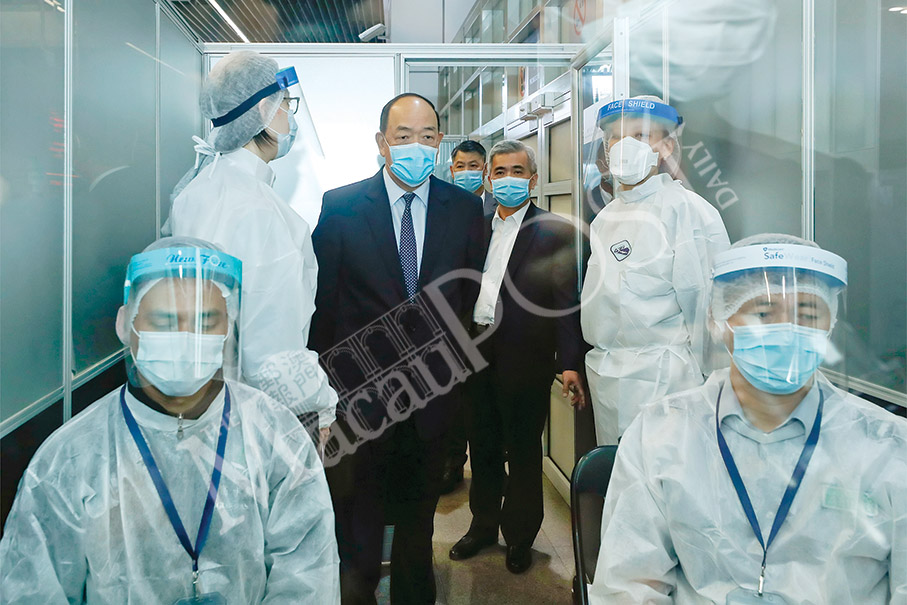
Chief Executive Ho Iat Seng (centre), accompanied by Secretary for Security Wong Sio Chak (right, first behind Ho), yesterday reviews disease-control measures implemented at the Barrier Gate checkpoint in the wake of the Wuhan virus outbreak. Photo: GCS
Ho said that he believed that Macau will experience a difficult period in its fight against the Wuhan virus after the CNY holiday.Ho also warned that if Macau’s Wuhan virus situation gets very serious or many cases are recorded in local casinos, the government would not rule out the possibility of closing the casinos.
Ho convened the press conference to brief the media on his government’s latest measures to tackle Wuhan virus menace.
The government set up the Novel Coronavirus Response and Coordination Centre earlier this week, which is directly supervised by Ho. Secretary for Social Affairs and Culture Elsie Ao Ieong U, who oversees the government’s health service portfolio and is the vice-president of the centre, also attended yesterday’s press conference.
2nd case a 66-year-old Wuhan tourist
In a press conference yesterday morning, the Health Bureau (SSM) announced that it has confirmed Macau’s second case of the Wuhan virus. The patient is a 66-year-old male tourist from Wuhan. He flew from Wuhan to Zhuhai on Wednesday morning, and was passing through the Barrier Gate checkpoint in the afternoon when a body temperate scanner detected his fever. He was then taken to the public Conde de S. Januário Hospital Centre. He tested positive for the Wuhan virus at 3 a.m. yesterday, according to the SSM press conference.
The first case, a 52-year-old woman from Wuhan, was confirmed on Wednesday.
Meanwhile, during yesterday morning’s press conference, SSM officials announced that both local residents and non-resident workers can each buy a maximum of 10 surgical masks every 10 days at 56 designated pharmacies upon presentation of their Macau ID cards or “blue cards”. The Health Bureau said on Wednesday that the mask purchase scheme would only be for local residents. In a statement last night, the bureau confirmed that the facemask purchase scheme was launched at 6 p.m. yesterday.SSM officials said that the masks sold in the 56 designated pharmacies are sold at the fixed price of eight patacas for 10 masks. Long queues started to form outside many of the designated pharmacies yesterday evening. Designated pharmacies are entitled to sell medicines prescribed by public health sector doctors.
However, people can also buy facemasks from other pharmacies and shops such as supermarkets at market prices.
Scanning temperature of departing travellers
Ho said that after attending yesterday morning’s ceremony in Wanzai marking the resumption of the Macau-Wanzai ferry service, he, Secretary for Security Wong Sio Chak and Secretary for Transport and Public Works Raimundo do Rosário held a meeting with top Zhuhai officials, where the two governments decided to jointly implement a new travellers’ body temperature monitoring measure at checkpoints on both sides of the border.
According to Ho, under the new measure, both sides will also scan the body temperature of departing travellers, in addition to the existing measure of scanning the body temperature of arriving travellers. Ho said the measure aimed to prevent those in Macau infected with the Wuhan virus from possibly spreading the disease on the mainland.
In reply to media questions, Ho said that Zhuhai’s checkpoints had already implemented the new monitoring measure on Wednesday, while the necessary equipment in the departure areas of Macau’s checkpoints began to be installed yesterday afternoon. There was no information from the local government as to whether the new measure had started to be implemented last night. Ho said during the one-hour press conference, which ended at 3 p.m., that the installation of the equipment would take time but nevertheless was expected to be completed soon.
CNY events axed, but firecrackers to stay
Ho also said that after Macau’s second case of the Wuhan virus was confirmed yesterday, the government had decided to cancel all its CNY celebratory events, namely the Golden Dragon Parade, a float parade and a firework display.
According to Ho, the government has also urged city’s community associations to postpone their CNY banquets. Ho noted that the CNY celebratory events and community associations’ CNY banquets usually attract a large number of people in a relatively small space.
However, Ho emphasised that the government will keep the traditional CNY activity of people letting off firecrackers or fireworks in officially designated areas, as it is not an activity that many people go to watch and only those who let off firecrackers or fireworks will go there. Ho said the government believes that it is feasible to keep the traditional activity provided that disease-control measures are well implemented.
There are two designated areas for the selling and letting-off of firecrackers and fireworks during the CNY period every year – an area in the Zone B reclamation area near Macau Tower, and the reclamation area in front of Estrada Almirante Marques Esparteiro on the northern waterfront of Taipa. This year, the two areas will open today (Chinese New Year’s Eve) and close on Wednesday night (the fifth day of the Chinese New Year).
Long incubation period
Ho noted that the Wuhan virus is different from the 2003 SARS virus. Ho said that people infected with the 2003 SARS virus “obviously had a fever”, whereas the incubation period of the Wuhan pneumonia is long and its symptoms are less severe than the 2003 SARS virus. Ho said that people infected with the Wuhan virus normally do not have a fever in the early stage of the disease and only have a cough and a sore throat, adding that therefore it was not easy to detect people who have already been infected with the Wuhan virus.
“In the current weather, people [infected with the Wuhan virus] with a cough or a sore throat possibly think that they have just got a common disease and do not know that they have been infected with the virus in reality,” Ho said. Ho further noted that no vaccine has yet been developed for the Wuhan virus and no medicine has yet been developed for specifically tackling the novel coronavirus. Ho said that consequently he was urging residents to leave their homes as little as possible during the CNY holiday period and instead stay at home and rest.
Ho urged residents to show understanding of the government’s decision to cancel its CNY festivities.
The Health Bureau said on Wednesday that it had ordered 20 million surgical masks for the mask purchase scheme. During yesterday afternoon’s press conference, Ho said that three million masks were scheduled to be delivered to Macau by yesterday evening, which would then be delivered to the designated pharmacies, with the remaining masks to be delivered to Macau in due course.
Ho noted that there is a serious lack of masks in the market on the mainland, adding that the local government has chosen to order masks from foreign countries “regardless of the [possible] high cost” to ensure that the number of masks in the Macau market is sufficient to meet residents’ needs.
Respiratory expert: Importance of wearing mask correctly
When asked what advice Zhong Nanshan, a renowned respiratory expert and head of a high-level team of the National Health Commission (NHC), gave to the local government to tackle the Wuhan virus during Wednesday’s meeting with him, Ho said that the opinions given by Zhong included the importance of wearing the facemasks correctly and that staying at home was the safest way of preventing infection. Ho said that since January 1, he and Zhong had had a telephone conservation every day to exchange the latest information on the disease and the local government’s latest measures against the novel coronavirus.
Thousands of Wuhan people in Macau
Ho said that 3,047 residents of Hubei province, including 2,077 Wuhan residents, had been granted a permit to stay in Macau earlier this month and were still here on Wednesday, while 3,466 Hubei residents who obtained a permit last month to stay in Macau, including, 2,256 Wuhan residents, were also still here on Wednesday.
Wuhan is the capital city of Hubei.
Ho said that 1,247 Hubei residents entered Macau on Wednesday, when 929 left Macau. In Macau, there are currently 2,946 non-residents workers who are from Hubei, and 14 of their family members, while 69 hold a special permit to stay here.
Ho urged Hubei residents who are still staying in Macau not to return to their province and instead spend the Chinese New Year in Macau. Ho urged those who have already returned to Hubei not to re-enter Macau after the Chinese New Year until the Wuhan virus situation has been brought under control.
Ho also said that 457 students from Hubei are currently enrolled in local tertiary education institutions, 180 of whom are Wuhan residents.
Meanwhile, the Health Bureau announced last night that including the two confirmed Wuhan virus patients 17 people are currently in isolation, 10 of them because of their close contact with the two patients and five because they are regarded as high-risk cases. While the two patients are at the isolation ward of the public hospital, the 15 others are at an isolation facility run by the bureau in Coloane.Meanwhile, Ho paid an inspection visit to the Barrier Gate checkpoint last night where he was briefed about the local authorities’ anti-Wuhan virus measures.
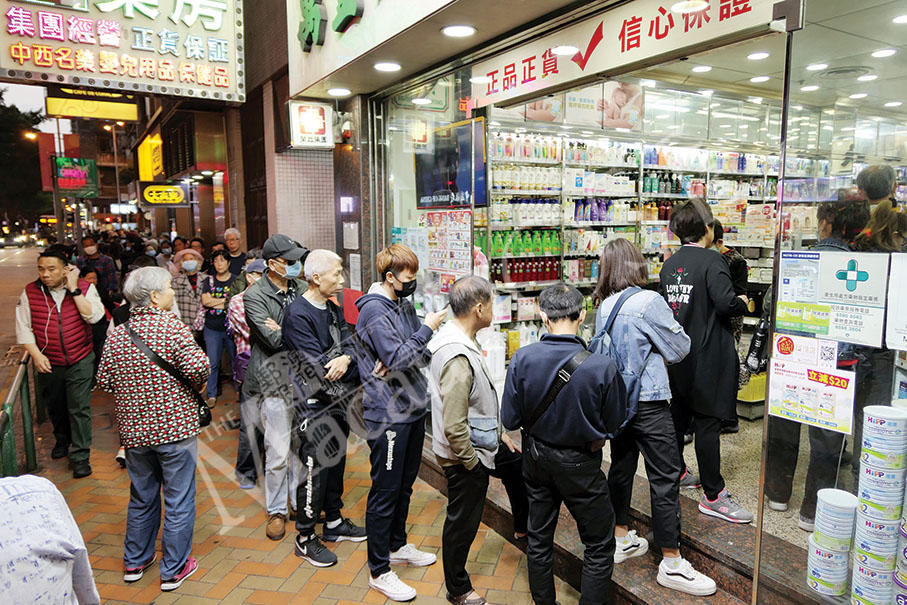
Residents queue to buy facemasks yesterday evening from a designated pharmacy in Avenida de Horta e Costa supplied by the Health Bureau (SSM) under the government’s rationing system. Photo: Iong Tat Choi
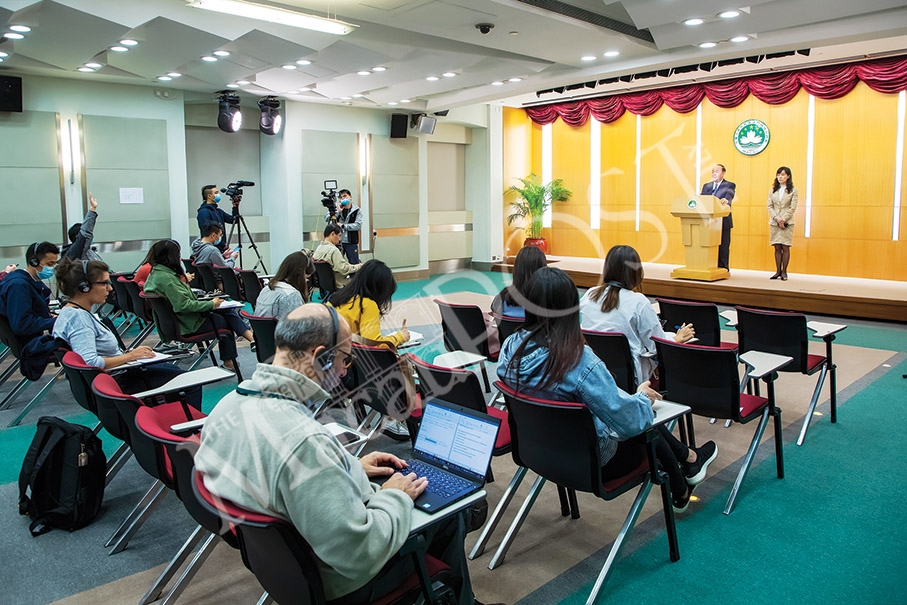
Journalists attend yesterday’s press conference at Government Headquarters hosted by Chief Executive Ho Iat Seng (left, on stage), accompanied by Secretary for Social Affairs and Culture Elsie Ao Ieong U. – Photo: GCS

